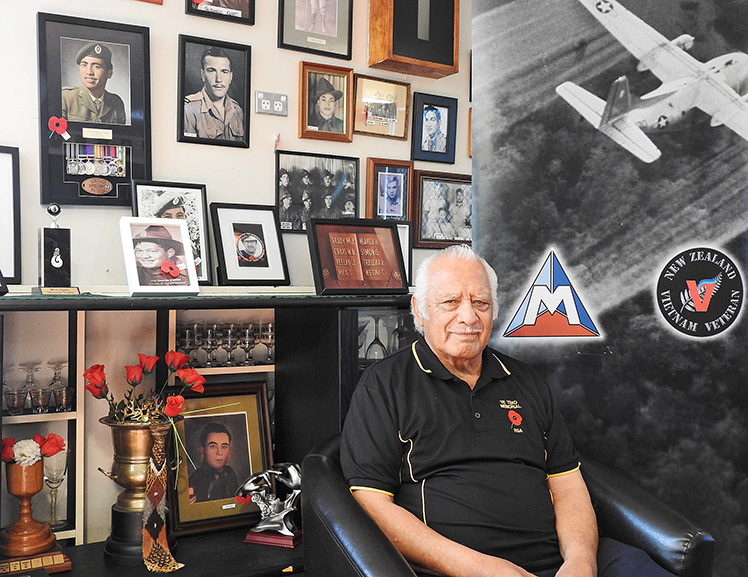Study sheds lights on impacts of war on veterans, families

COLLABORATIVE: Hemana Waaka has presented his study on the impacts of the Southeast Asian conflicts on veterans and their families. Photo Troy Baker E4828-01
Kathy Forsyth
A significant study has shed light on the impacts of war on the health and wellbeing of veterans and their whānau.
Hemana Waaka, a veteran himself, recently presented findings from his research, Māori Veterans’ Health Claims, based on interviews with 34 veterans and a few widows across the North Island.
Launched in 2019 and completed three years later, the research is a collaboration between Te Parairoa a Tumatauenga Company and Te Whare Wānanga o Awanuiārangi.
It focuses on veterans who served in Borneo, Malaya, and Vietnam, highlighting gaps in health reports from the NZ Defence Force and the Crown.
Mr Waaka, who served 20 years in the NZ Army, including stints in Malaya and Singapore, emphasised the importance of trust and comradeship in gathering veterans’ stories.
With his own personal experiences in these conflicts, he believed he was best placed to speak to veterans for the research.
“It is a matter of trust and comradeship. This is possibly the first Māori hauora report that has been done by a veteran for veterans.”
Assisted by a visual media student from Waikato University, the interviews were recorded, digitised, and archived.
One poignant story from a widow in Ruatoria recounted her husband’s decline after returning from Vietnam, suffering from undiagnosed PTSD and health issues related to Agent Orange exposure. It wasn’t until reunions that veterans realised others shared similar conditions.
“His behaviour changed over the next two or three years, and they couldn’t figure out what it was. They also couldn’t have any children. She miscarried two or three times, and so they adopted children, but his behaviour was getting worse.
“He was having PTSD. No one knew what it was, and by the time they did, it was too late. She stayed with him for 43 years.”
Just over 3000 New Zealanders served in Vietnam, where exposure to Agent Orange and other illnesses was common.
Despite initial government denial, a select committee confirmed the exposure, leading to funding for affected veterans and their families. Official acknowledgment came in 2004, but many veterans still feel betrayed.
He said soldiers were also exposed to other illnesses in the East Asia conflicts – malaria, scrub typhus, leptospirosis, and injuries.
The study recommends several improvements:
- Enhanced communication with Veterans Affairs, including regional offices for personal consultations.
- Continuation of the Memorandum of Understanding between Veterans Affairs and RSAs (which was signed in December).
- Promotion of ACC services for pre-1974 medical issues, with workshops to inform veterans.
- Initiation of Māori practical healing as an alternative to Western medicine.
- A 12-month trial through Te Puna Ora o Mataatua to use Māori healers in culturally appropriate settings.
- A commission of inquiry to investigate genetic damage from chemical exposure in Southeast Asia.
Mr Waaka’s research was overseen by Professor Te Kani Kingi, the executive director of research and innovation at Awanuiārangi.